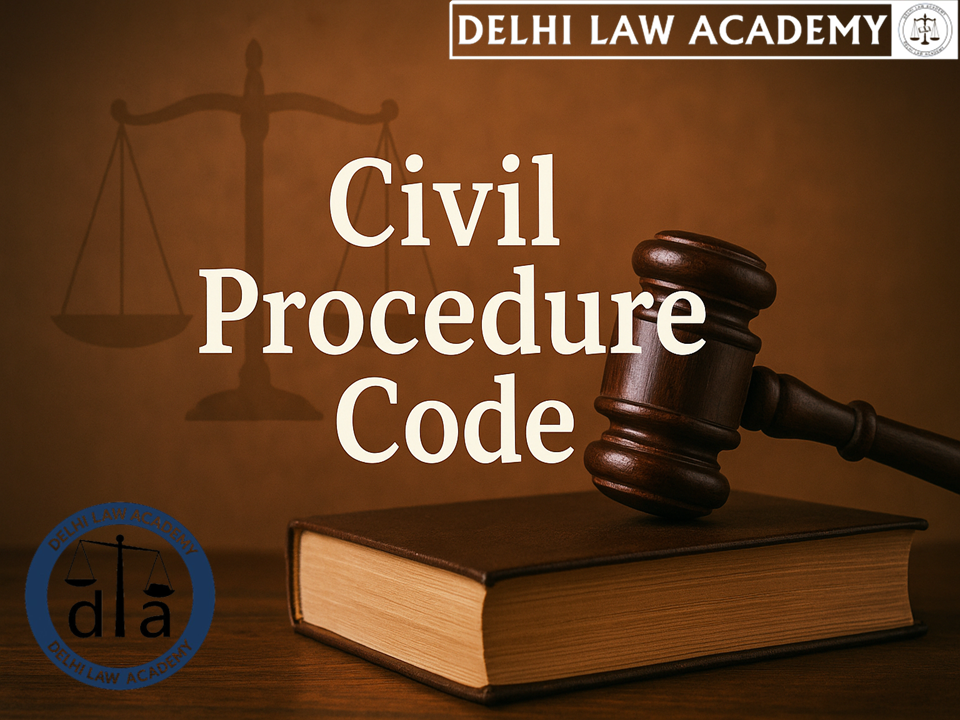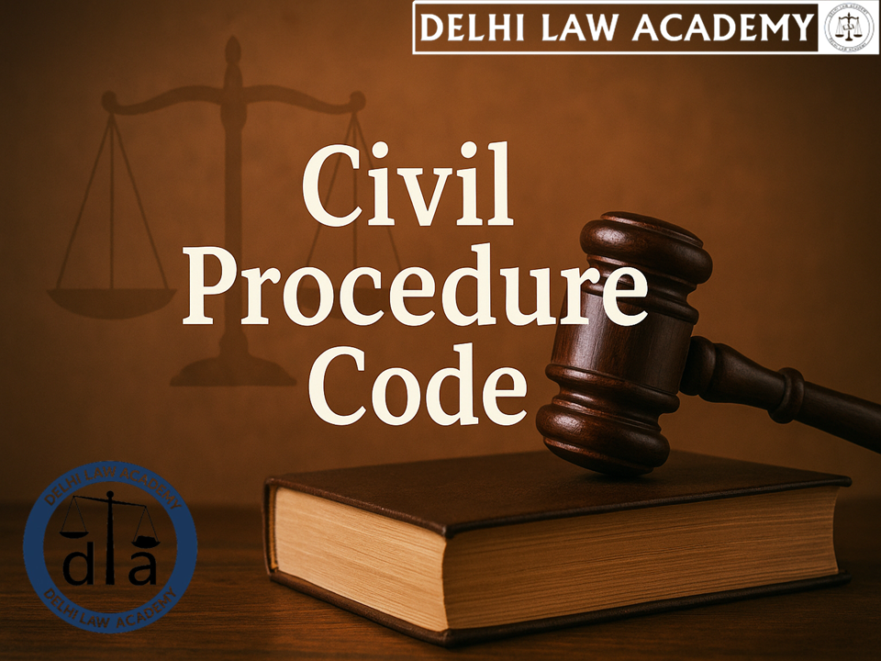
📘 CIVIL PROCEDURE CODE : RULES IN FIRST SCHEDULE CPC
📚 TOPICS
- Effect of rules in First Schedule
- Power of High Courts to make rules
- Constitution of Rule Committees
- Rules to be subject to approval
- Publication of rules
- Matters for which rules may provide
- Rules as to original Civil jurisdiction
- Publication of rules
🎯 Preparation for RJS, DJS, PCS (J) and other Judicial Service Exams
CIVIL PROCEDURE CODE EXPLAINED:
The Civil Procedure Code forms the bedrock of any and every Judicial Service exam in the country. Its thorough knowledge is a must for all aspirants of RJS, DJS, PCS (J) and every other Judicial Service exam. To help such aspirants, DELHI LAW ACADEMY JAIPUR has launched a series of study material modules on all important aspects of this vital part of their syllabus.
⚖️ Effect of Rules in First Schedule (Section 121)
- Rules in the First Schedule shall have effect as if enacted in the body of this Code.
- They remain in force until annulled or altered under this Part.
⚖️ Power of High Courts to Make Rules (Section 122)
- High Courts (not being Courts of Judicial Commissioners) may make rules regulating:
- Their own procedure and the procedure of Civil Courts subject to their superintendence.
- By such rules, they may annul, alter or add to any rules in the First Schedule.
⚖️ Constitution of Rule Committees (Section 123)
Section 123(1): A Committee to be called the Rule Committee shall be constituted at the usual place of sitting of the High Court.
Section 123(2): Such Committee shall consist of:
- Three Judges of the High Court, one of whom must have served as District Judge for three years,
- Two legal practitioners enrolled in that Court, and
- A Judge of a Civil Court subordinate to the High Court.
Section 123(3): Members of each such Committee shall be appointed by the High Court, which shall also nominate one of their number to be the President.
⚖️ Committee to Report to High Court (Section 124)
- The Rule Committee shall make a report to the High Court on any proposal to annul, alter, or add to the rules in the First Schedule or to make new rules.
- The High Court shall take such report into consideration before making any rules under Section 122.
⚖️ Power of Other High Courts to Make Rules (Section 125)
- High Courts other than those specified in Section 122 may exercise the powers conferred by Section 122, subject to such conditions as the State Government may determine.
Instances of Judicial Commissioners’ Courts declared as High Courts:
(1) The Judicial Commissioners’ Courts (Declaration as High Courts) Act 1950:
• The Courts of the Judicial Commissioners for Manipur and Tripura are hereby declared to be High Courts for purposes of Articles 132, 133, and 134.
(2) Goa, Daman and Diu Judicial Commissioner‘s Court Act 1964:
• The Court of the Judicial Commissioner for the Union territory of Goa, Daman and Diu is hereby declared to be a High Court for purposes of Articles 132, 133, and 134.
⚖️ Rules to be Subject to Approval (Section 126)
- Rules made under the foregoing provisions shall be subject to:
- Previous approval of the Government of the State in which the Court is situated, or
- Previous approval of the Central Government, if that Court is not situated in any State.
⚖️ Publication of Rules (Section 127)
- Rules so made and approved shall be published in the Official Gazette and shall have the same force and effect within the jurisdiction of the High Court as if contained in the First Schedule.
⚖️ Matters for which Rules may Provide (Section 128)
Section 128(1): Such rules shall not be inconsistent with the provisions in the body of this Code, but subject thereto, may provide for any matters relating to the procedure of Civil Courts.
Section 128(2): Such rules may provide for:
- Service of summons, notices, and other processes by post or in any other manner and proof of such service.
- Procedure in suits of counterclaim and valuation of such suits.
- Summary procedure.
- Consolidation of suits, appeals, and other proceedings.
- All forms, registers, books, entries, and accounts for the transaction of business of Civil Courts.
⚖️ Rules as to Original Civil Jurisdiction (Section 129)
- Notwithstanding anything in this Code, any High Court may make such rules as it thinks fit to regulate its own procedure in exercise of its original civil jurisdiction, not inconsistent with the Letters Patent or other law establishing it.
⚖️ Publication of Rules (Section 131)
- Rules made in accordance with Section 129 shall be published in the Official Gazette and have the force of law from the date of publication or such other date as specified.
📚 Continue Your CPC Preparation
Don’t stop here! Strengthen your knowledge of the Civil Procedure Code with our other fully solved tests:
📘 Free Study Material for Judiciary Aspirants!
Download our FREE study material prepared by Delhi Law Academy’s expert faculty.
💡 Frequently Asked Questions (FAQs) on Rules in First Schedule CPC
Contact us
📍 Delhi Law Academy – Jaipur Branch
6C, Tower 2, Coaching Hub, Pratap Nagar, Jaipur – 302033
📞 Phone:
+91 9911916552
+91 8447285606
✉️ Email:
contactus@delhilawacademy.com

